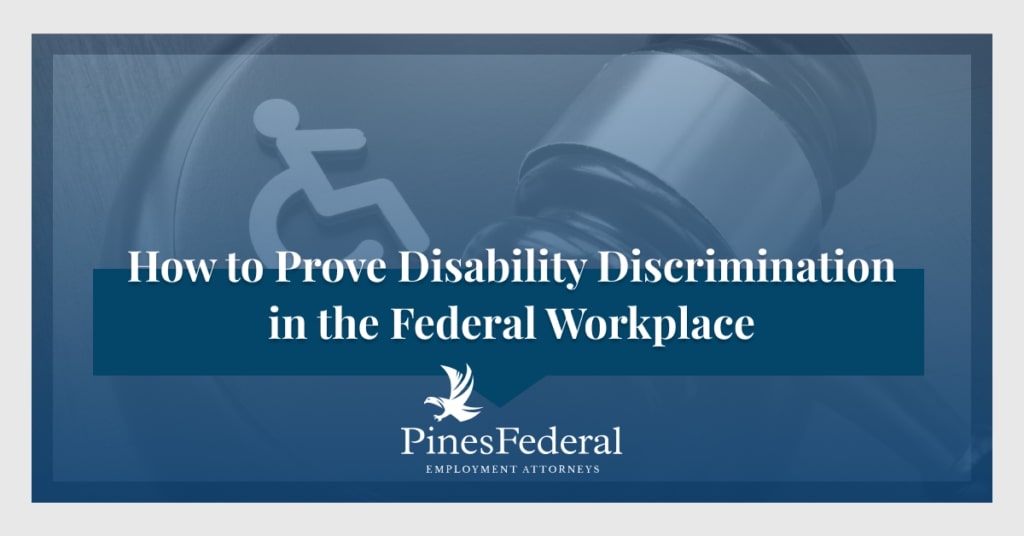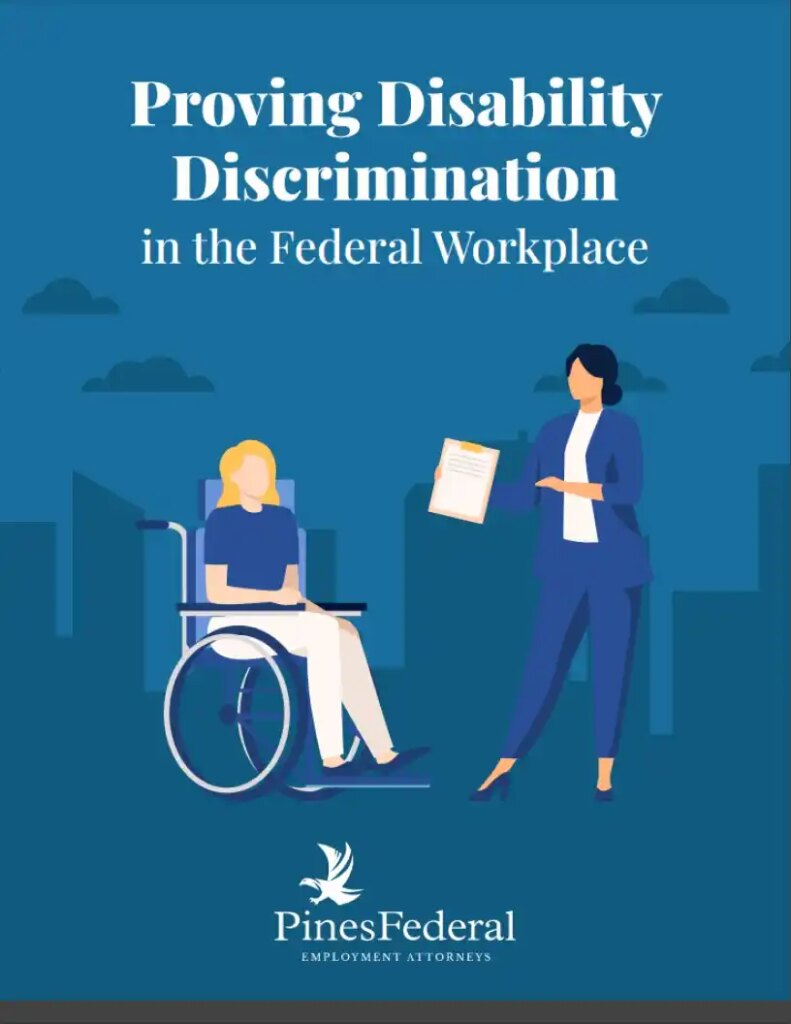
Over the past decade, the U.S. Equal Employment Opportunity Commission (EEOC) has reported that discrimination and retaliation are the most common issues federal employees face.
Federal laws prohibit discrimination based on race, color, sex, religion, national origin, age, genetic information, and disability.
If you believe your employer has discriminated against you because of your disability and want to file a claim, you will need to provide strong evidence to prove your case.
Our team at Pines Federal explains what you need to prove EEO disability discrimination.
Learn how our federal employment discrimination lawyers can assist you today by calling (800) 801-0598 or filling out our online form today.


“They listened to my needs and concerns, were very empathetic and understanding, and recommended solutions with genuine care for me being successful. I highly recommend Pines Federal for anyone needing EEO enforcement guidance!”
What Is a Disability?
Knowing how to prove disability discrimination begins with understanding the legal definition of a disability. Under federal law, a disability is a physical or mental condition that substantially limits one or more major life activities.
Major life activities include activities such as walking, speaking, seeing, hearing, and working. A disability can be temporary or permanent, and it can be visible or invisible.
As you can see, that definition of disability is quite broad. This is intentional. In 2008, Congress passed the Americans with Disabilities Amendments Act (ADAAA), which made clear employers should broadly construe the definition of “disability.”
Provided an individual has a disability, all they need to do to receive disability discrimination protection is make sure their disability is perceived by the employer.
Laws Supporting Individuals with Disabilities
The Americans with Disabilities Act (ADA) is the legal cornerstone of disability discrimination law. This law applies to all private sector employers with 15 or more employees and all federal, state, and local government employers.
The ADA requires all covered employers to provide reasonable accommodations to individuals with disabilities so that they can perform their jobs effectively.
The ADA also prohibits covered employers from taking adverse employment action against individuals with disabilities because of their disability, and it requires employers to provide equal employment opportunities to individuals with disabilities.
The ADA is not the only law protecting individuals with disabilities. There are several other federal laws, like the Rehabilitation Act, that provide protection against disability discrimination in the workplace.
What Is Considered EEO Disability Discrimination?
According to the EEO, disability discrimination occurs when an employer or other entity covered by the Americans with Disabilities Act (ADA) treats a disabled employee unfavorably because of their disability.
As we mentioned before, a person has a disability if they have a physical or mental condition that substantially limits a major life activity–such as walking, talking, seeing, hearing, learning, or operation of a major bodily function.
Federal laws require employers to provide reasonable accommodation to an employee or job applicant with a disability unless it would cause undue hardship to the employer.
The law also protects people from discrimination based on their relationship with a person who has a disability.
Proving EEO Disability Discrimination
If you believe you face disability discrimination from your federal employer, you can file a claim against them.
To file a claim, you will need to provide sufficient evidence that you are, in fact, experiencing disability discrimination in the workplace.
Three Ways to Prove Disability Discrimination
Before you file a claim that you were discriminated against, you will need to prove that you were treated unfavorably compared to other workers without a disability. You can demonstrate this in several ways.
#1 – Direct Evidence
Direct evidence is the most compelling kind of evidence. In the realm of criminal law, an example of direct evidence would be a video showing a murder taking place.
Insofar as disability discrimination cases go, direct evidence is anything that directly links the adverse employment action to the individual’s disability.
One example might be a written statement from the employer that the individual was fired because of their disability.
An audio recording of an agency official using prejudicial language against the individual with a disability would also be direct evidence.
#2 – Circumstantial Evidence
Circumstantial evidence is indirect evidence that a court can use to infer to make a certain legal finding.
For disability discrimination cases, circumstantial evidence can include things like a pattern of adverse employment actions against individuals with disabilities.
Another good example of circumstantial evidence is a history of discriminatory comments by your manager or co-worker.
Yet another example is statistical evidence that shows a disparity in your workplace between individuals with disabilities and non-disabled people.
Circumstantial evidence is not as persuasive as direct evidence. However, you can still prevail in your case if you present a sufficient amount of it to a judge.
#3 – Comparative Evidence
One important way to prove your disability discrimination claim is by looking at similarly situated employees in your workplace.
In other words, you need to assess whether your non-disabled colleagues are treated better than you in some way.
For instance, do you notice that you and another employee with a disability receive different job assignments? Or does your supervisor skip you for overtime shifts while allowing your colleagues to work them?
If you can provide information about another worker who has a similar position to yours without a disability and who is treated favorably, it can make a critical difference to the success of your case.
How to Prove Discrimination at Work
Proving disability discrimination at work is a process. First, you establish what lawyers call “prima facie” evidence by showing that you are a federal employee with a disability.
Prima facie evidence also requires you to show that you could perform your position and that you suffered an adverse action because of your disability.
Once you satisfy this initial requirement, your employer has to present a legitimate and non-discriminatory reason for the adverse action.
Ultimately, the burden is on you to persuade the administrative judge of discrimination. To do that, you will also need to demonstrate that there is no legitimate, nondiscriminatory reason why the employer treated you differently.
For instance, If your employer demonstrates favoritism to another employee, you will need to show that the favoritism toward others in a similar position was not based on them possessing more qualifications or having more experience than you.
Reasonable Accommodation & Failure to Accommodate Claims
Another form of disability discrimination is failing to accommodate an employee’s disability.
The Americans with Disabilities Act (ADA) mandates that federal employers provide reasonable accommodations to employees with disabilities so that those employees can perform their core job functions.
Reasonable accommodations can include all kinds of changes to your job, including:
- Modifying your work hours,
- Providing you with specialized equipment,
- Letting you take breaks for your disability, and
- Allowing you to telework part-time or full-time.
When you request an accommodation, your employer has to engage in an interactive discussion with you to determine what accommodations you need.
If your employer fails to provide a reasonable accommodation or delays giving you an accommodation, you may have a legal claim for discrimination.
As with other EEO disability discrimination claims, you can recover damages, including compensatory damages and injunctive relief, if you prevail in your lawsuit.
Contact Our Federal Employment Discrimination Attorneys
Employment discrimination cases require experienced legal representatives who can navigate the specific laws that pertain to federal employee cases.
Our federal employment discrimination attorneys can help you gather the evidence you need to file a case against your employer for their wrongdoing.
We have over two decades of experience helping workers who were in the same situation you are in now. We can help you get the best possible outcome for your case.
Contact our federal employment discrimination lawyers today at (800) 801-0598 or reach us online to schedule a consultation!
[DOWNLOAD] Proving Disability Discrimination in the Federal Workplace
